No Results Found
The page you requested could not be found. Try refining your search, or use the navigation above to locate the post.

First published Dec. 12, 2024. Updated Dec. 21, 2024.
Okay, we know, we know, you’ve signed and shared petitions including multiple Member of Parliament sponsored e-petitions – THANK YOU.
[Those e-petions went a long way to getting Bill C-355 — a bill to ban the live export of horses from Canada to any other country by air for the purpose of slaughter or to fatten for slaughter — read in Parliament.]
You’ve called and written Members of Parliament and maybe even met with Members of Parliament – again and again. THANK YOU.
[Your responses helped get Bill C-355 through not only Parliament but also the Standing Committee on Agriculture and Agri-Food. WELL DONE.]
And now that Bill C-355 is in the hands of Canadian Senators you may have already contacted at least one Senator or multiple Senators. Again, THANK YOU.
You may have used form letters – like the one you’ll find HERE.
If not? Please do.
Again from the bottom of our hearts – THANK YOU.

NOTE: Government servers will block emails addressed to more than one person. We know it’s a pain but if you could send 11 individual emails your voice will be heard.
Subject: Urgent Support Needed for Bill C-355
Dear [Senator’s Name],
I am writing to respectfully urge you to support the swift passage of Bill C-355: the Prohibition of the Export of Horses by Air for Slaughter Act, currently under debate in the Senate. This critical piece of legislation addresses a profoundly inhumane practice that has no place in Canada’s modern values of compassion and animal welfare.
Every year, thousands of Canadian horses are subjected to harrowing journeys when they are tightly packed into wooden crates and flown to countries like Japan, where they are slaughtered for consumption as a raw delicacy. These flights, which can legally last up to 28 hours, often violate legal time limits for transport without food, water, or rest.
Horses endure immense physical and emotional stress, with inadequate space increasing the likelihood of injuries, collapses, and even deaths during transit.
Investigations by Animal Justice and Japan’s Life Investigation Agency have revealed the shocking realities of this practice. Evidence shows that flights frequently exceed legal time limits, and new records from the Government of Japan expose a higher rate of horse fatalities, injuries, and illnesses than Canadian reports acknowledge. This cruelty has drawn widespread condemnation from Canadians across all political affiliations.
Multiple e-petitions including one with over 77,000 signatures have been tabled in the House of Commons, reflecting the strong public demand for an end to this practice. Bill C-355 represents a narrowly focused and practical measure, targeting only the export of live horses for slaughter by air.
It does not impact the horse racing industry or the shipment of horses for other sporting purposes, or shows or personal use, all of which adhere to much higher standards of care when shipping. Furthermore, as a stand-alone bill, it cannot be amended in ways that would compromise its intent, eliminating concerns about potential overreach into other sectors.
Canada’s government pledged to ban the export of live horses for slaughter in 2021, and MP Tim Louis introduced Bill C-355 in 2023 to fulfill this promise. While the bill has successfully passed the House of Commons, it faces delays in the Senate. These delays risk perpetuating unnecessary suffering for countless horses and undermining Canada’s commitment to humane treatment of animals.
Supporting Bill C-355 affirms Canada’s dedication to compassion, empathy, and justice. It sends a clear message that we prioritize the welfare of our animals and align our policies with the values of the Canadian people. I implore you to vote in favour of this bill and advocate for its expeditious passage through the Senate.
Thank you for considering this urgent matter. I look forward to your response and to seeing Canada take a meaningful step toward a more humane future.
Sincerely,
[Your Name]
[Your Address]
[Your Email Address]
[Your Phone Number]
SENATOR ROBERT BLACK
(Chair)
Province: Ontario
Affiliation: Canadian Senators Group
Telephone: 613-943-3416
Email: robert.black@sen.parl.gc.ca
Sadly, Senator Black is strongly opposed to Bill C-355.
SENATOR PAULA SIMONS
(Deputy Chair)
Province: Alberta
Affiliation: Independent Senators Group
Telephone: 613-943-8242
Email: Paula.Simons@sen.parl.gc.ca
SENATOR SHARON BUREY
Province: Ontario
Affiliation: Canadian Senators Group
Telephone: 613-996-8692
Email: Sharon.Burey@sen.parl.gc.ca
SENATOR MARNIE MCBEAN
Province: Ontario
Affiliation: Independent Senators Group
Telephone: 613-995-5770
Email: Marnie.McBean@sen.parl.gc.ca
SENATOR MANUELLE OUDAR
Province: Quebec – La Salle
Affiliation: Independent Senators Group
Telephone: 613-995-3172
Email: Manuelle.Oudar@sen.parl.gc.ca
SENATOR KAREN SORENSEN
Province: Alberta
Traditional Territory: Treaty 7
Affiliation: Independent Senators Group
Telephone: 613-944-1115
Email: Karen.Sorensen@sen.parl.gc.ca
SENATOR JOHN M. MCNAIR
Province: New Brunswick
Affiliation: Independent Senators Group
Telephone: 613-995-5060
Email: John.McNair@sen.parl.gc.ca
SENATOR CHANTAL PETITCLERC
Province: Quebec – Grandville
Affiliation: Independent Senators Group
Telephone: 613-995-0298
Email: Chantal.Petitclerc@sen.parl.gc.ca
SENATOR ELIZABETH MARSHALL
Province: Newfoundland and Labrador
Affiliation: Conservative Party of Canada
Telephone: 613-943-4011
Email: elizabeth.marshall@sen.parl.gc.ca
SENATOR TRACY MUGGLI
Province: Saskatchewan
Affiliation: Progressive Senate Group
Telephone: 613-943-1382
Email: Tracy.Muggli@sen.parl.gc.ca
SENATOR DAVID RICHARDS
Province: New Brunswick
Affiliation: Non-affiliated
Telephone: 613-943-6263
Fax: 613-943-6265
Email: David.Richards@sen.parl.gc.ca

BUT WAIT… Didn’t we say there were 12 Senators on the committee but we’ve only mentioned 11 emails – so far?
Senator Pierre Dalphond is on the Committee and fighting tirelessly to push this bill through as written. If you have an extra minute or two, please send him a thank you note!
SENATOR PIERRE J. DALPHOND
Province: Quebec – De Lorimier
Affiliation: Progressive Senate Group
Telephone: 613-943-3688
Fax: 613-943-3684
Email: PierreJ.Dalphond@sen.parl.gc.ca
April 2025:
We have the opportunity to buy a mare and newborn foal who are sitting on a kill lot who otherwise will be slaughtered at the Bouvry plant in Alberta.
Of course, the initial expense of buying horses from First Nations (or kill buyers) so they are not shipped to slaughter is not the biggest nut to crack. Hay, feed, vetting, farrier, and other costs are needed in addition to funds to initially purchase horses to prevent them from being shipped to slaughter - or being left to languish in pens awaiting the same fate.
We always hate to ask but if you are able to help we would love to be able to purchase these two...
Again, we can’t save them all but with your help we can save these 2.

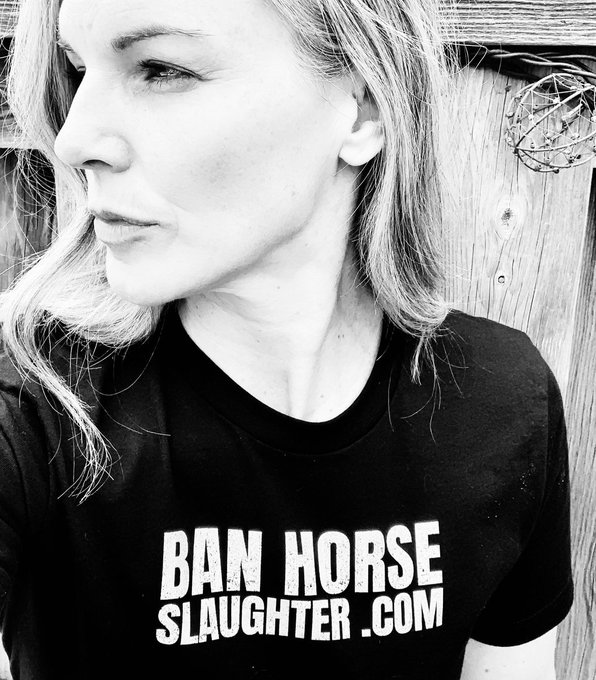
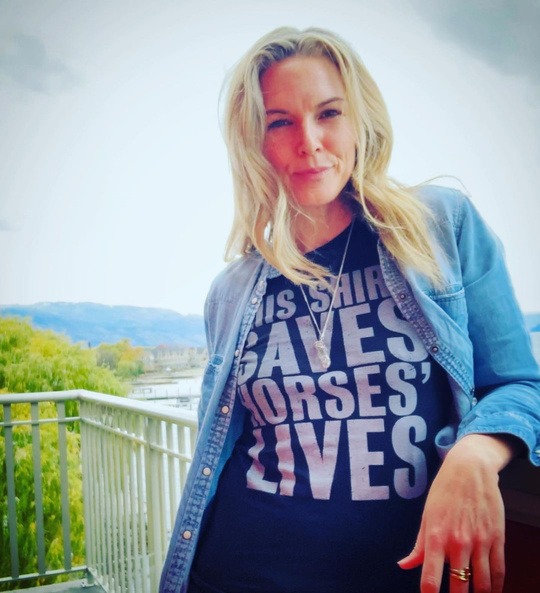
The page you requested could not be found. Try refining your search, or use the navigation above to locate the post.
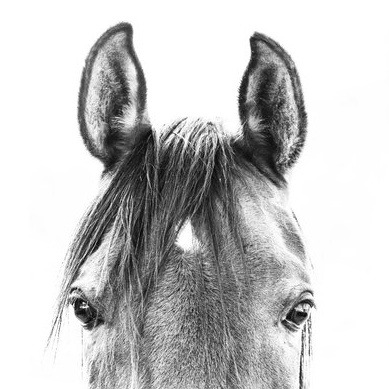
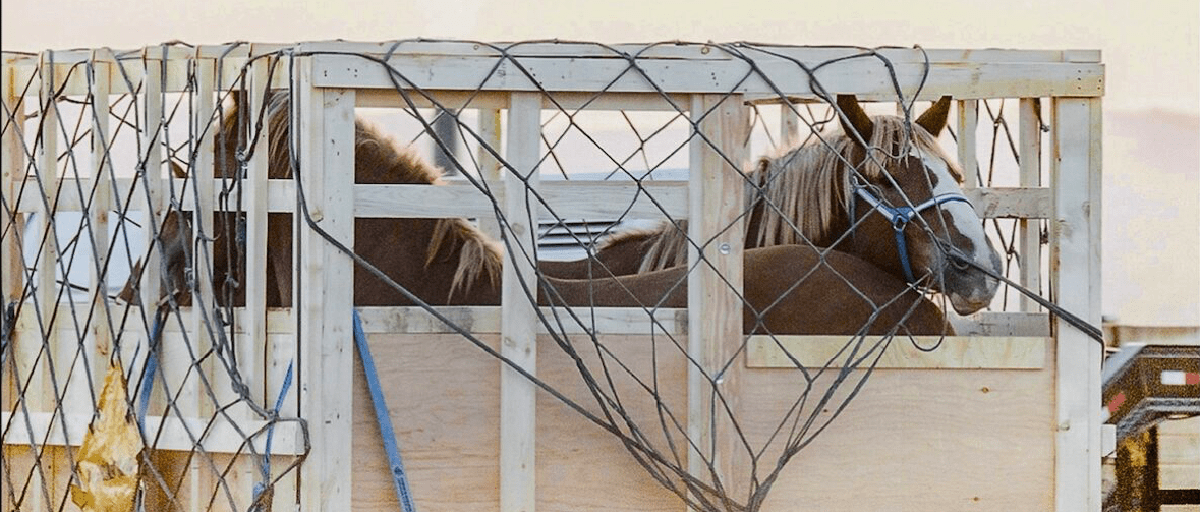
The Honourable Lawrence MacAulay, the current Minister of Agriculture and Agri-Food, has the power to end the inhumane export of horses by air for slaughter by enacting a regulatory amendment.
Help spread the word by sharing this email campaign with friends and family! You can also support the cause by donating—your contribution will help fund advertising efforts to raise awareness and push for change. Every action makes a difference!
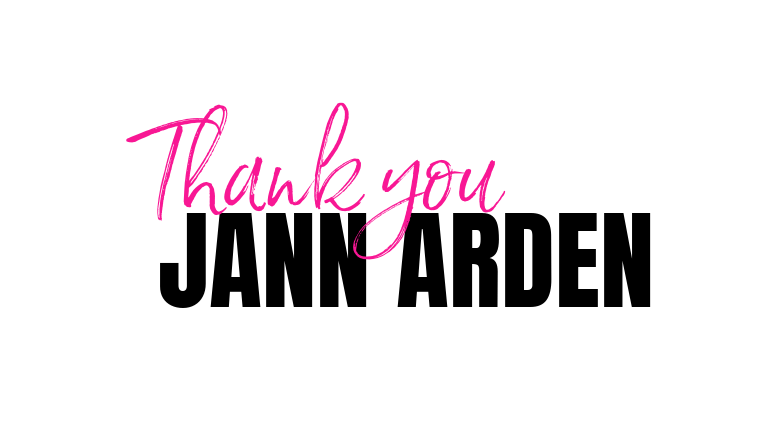
Thank you, Jann Arden, for your unwavering commitment to advocating for the protection of horses. Your efforts, particularly in helping to ban the live export of horses for slaughter, have made a tremendous difference. (That is an understatement – where would this cause be without you?)
It’s inspiring to see you continue to use your platform to raise awareness, and your recent features in the press are a testament to the importance of this cause. Your dedication is deeply appreciated!

Even though not a single member of the Conservative Party was willing to vote in favour of Bill C-355 -- and every step of the way Conservatives fought to block Bill C-355 - designed to ban the export of horses for slaughter...
The Liberal Party persisted and Bill C-355 has now passed through Parliament - it is out of the hands of the Prime Minister and Members of Parliament and it is in the hands of Canadian Senators.
Would you, could you, take a few minutes this holiday season to send 11 individual emails to the Senators who serve on the Senate Committee on Agriculture and Forestry?
(OR FILL OUT A 30 SECOND FORM LETTER?)
After watching hours of presentations in the Senate, reading and re-reading transcripts we know those opposing the bill AND those in favour of the bill are assuming it will go to Committee after the break for the holidays. So we need to make noise – NOW.

April 2025:
We have the opportunity to buy a mare and newborn foal who are sitting on a kill lot who otherwise will be slaughtered at the Bouvry plant in Alberta.
Of course, the initial expense of buying horses from First Nations (or kill buyers) so they are not shipped to slaughter is not the biggest nut to crack. Hay, feed, vetting, farrier, and other costs are needed in addition to funds to initially purchase horses to prevent them from being shipped to slaughter - or being left to languish in pens awaiting the same fate.
We always hate to ask but if you are able to help we would love to be able to purchase these two...
Again, we can’t save them all but with your help we can save these 2.



The page you requested could not be found. Try refining your search, or use the navigation above to locate the post.


The Honourable Lawrence MacAulay, the current Minister of Agriculture and Agri-Food, has the power to end the inhumane export of horses by air for slaughter by enacting a regulatory amendment.
Help spread the word by sharing this email campaign with friends and family! You can also support the cause by donating—your contribution will help fund advertising efforts to raise awareness and push for change. Every action makes a difference!
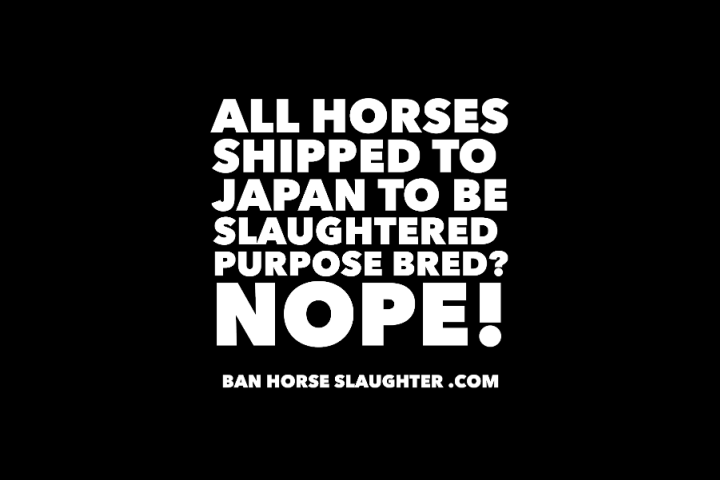
First published August 31, 2022 – UPDATED December 14, 2024.
Have you ever wondered who is behind exporting horses from Canada to Japan for the purpose of slaughter for human consumption?
According to an article from Ontario Farmer magazine titled:
HORSES STILL HEAD TO JAPAN
(Print Edition) Tuesday, Aug 30, 2022
Page: B13
Section: Livestock
“Kevin Wilson‘s diversified farming operation at Vankleek Hill [Ontario, Canada] facilitates the majority of these exports.”
By “these” exports the article means horses exported from Canada to Japan for the purpose of slaughter for human consumption.
The article goes on to say:
“Thinly sliced horse meat, called basashi, is a sought after product in Japan and is a great export market, adding value to farmers for Canada’s surplus horses, he [Kevin Wilson] said.”
We found the use of the word “surplus” in the article from Ontario Farmer interesting.
For years we’ve been led to believe that horses shipped to Japan for slaughter were specifically bred for that purpose, yet according to the article Kevin Wilson stated…
“Japan…” “is a great export market, adding value to farmers for Canada’s surplus horses…”
Could it be that at least some of the “surplus” horses were not purpose bred and that some of those shipped to Japan are treated with drugs typically used on horses – for example wormers and BUTE – drugs known to be toxic to humans?
Scroll down to learn more about Kevin Wilson.
You may be surprised to learn that according to Facebook, Twitter and YouTube accounts and various articles in the press, Kevin Wilson not only breeds and raises Percherons, his farm business owns 300 Percherons and he shows Percherons at fairs and events in Canada and the USA.
Are you shocked that someone who shows horses would facilitate the shipment of horses to slaughter?
Kevin Wilson features the picture above on his farm’s Twitter account.
With the caption…
“Something special about a girl and her horse”.
We found that an interesting quote from someone who ships his “surplus horses” to Japan by air to be slaughtered for human consumption.
From an article titled “Busy, successful show season for Wilson Farms Percherons” published by THE REVIEW . CA
“A full schedule of horse shows and agricultural fairs is back across Canada and the United States this year, and that has meant a busy, successful show season for Percheron draught horses from Wilson Farms of Vankleek Hill.
Draught horses have been in our blood for the last three to four generations,” says Kevin Wilson, who co-owns and operates Wilson Farms with his father, Ian Wilson. The main business of Wilson Farms is grain storage and elevation, and they also have beef cattle.
According to Kevin Wilson, the farm has around 300 Percheron draught horses, mostly being raised in Indiana, Ohio, and Missouri. Out of those 300, 11 geldings are used for shows across Canada and the United States. Many of the horses are raised for purchase by Amish farmers in the Midwestern US.”
Further down the article goes on to state:
“So far in 2022, Wilson horses have consistently been in the top five in their classes at draught horse shows locally and in the United States. At the TLA Classic Show in Topeka, Indiana, they placed fourth out of 16 entries in the Classic Series Cart Class, third out of seven teams in the Percheron Six Horse Hitch, first out of 16 teams in the Junior Cart Class, and second out of five teams in Percheron Pair Class.”
Okay, so if you are not aware, Canada allows for the live transport of horses to other countries for the purpose of slaughter.
Make no mistake about it, the way in which these horses are transported in no way shape or form resembles the way show and sporting horses are transported.
Horses are crammed in crates, often 3 or even 4 in crates designed for one horse – but don’t take our word for it – watch the full CTV W5 report here.
BELOW you will find a 2 minute video that includes a shipper freely admitting that regulations limiting the length of time horses can be in transport without food, water or veterinary care was recently broken – with permission of the CFIA – the federal agency charged with protecting the safety of livestock being transported within and out of Canada.


April 2025:
We have the opportunity to buy a mare and newborn foal who are sitting on a kill lot who otherwise will be slaughtered at the Bouvry plant in Alberta.
Of course, the initial expense of buying horses from First Nations (or kill buyers) so they are not shipped to slaughter is not the biggest nut to crack. Hay, feed, vetting, farrier, and other costs are needed in addition to funds to initially purchase horses to prevent them from being shipped to slaughter - or being left to languish in pens awaiting the same fate.
We always hate to ask but if you are able to help we would love to be able to purchase these two...
Again, we can’t save them all but with your help we can save these 2.

We are 100% volunteer & crowdfunded.
0% goes towards salaries. Yes, ZERO.
You do NOT need a PayPal account to donate through PayPal.
You may make a one time donation or if you prefer set up a monthly donation.
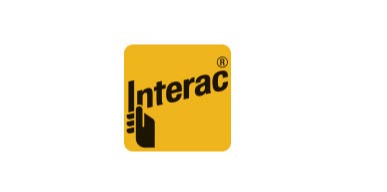
EMAIL for e-transfer or PayPal:
donations@banhorseslaughter.com
If asked for a security answer please use horses




The page you requested could not be found. Try refining your search, or use the navigation above to locate the post.


The Honourable Lawrence MacAulay, the current Minister of Agriculture and Agri-Food, has the power to end the inhumane export of horses by air for slaughter by enacting a regulatory amendment.
Help spread the word by sharing this email campaign with friends and family! You can also support the cause by donating—your contribution will help fund advertising efforts to raise awareness and push for change. Every action makes a difference!
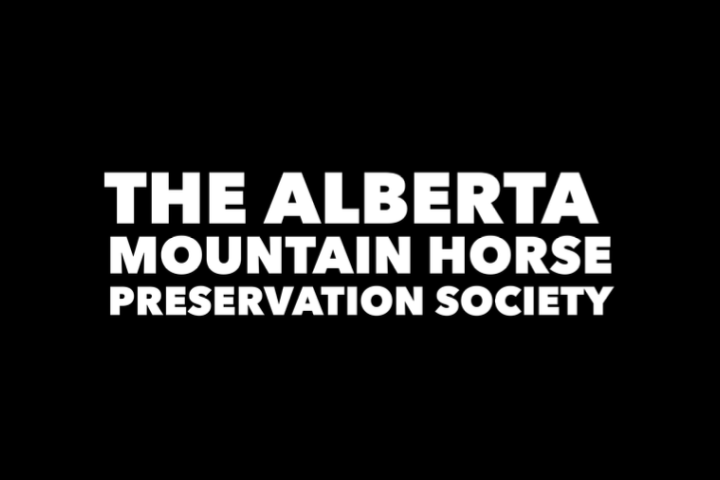
The Alberta Mountain Horse Preservation Society are very concerned about wild horses and the threats to their existence in Alberta.
They are a non profit society and we found the questions and concerns they shared in this post especially interesting.


The page you requested could not be found. Try refining your search, or use the navigation above to locate the post.
April 2025:
We have the opportunity to buy a mare and newborn foal who are sitting on a kill lot who otherwise will be slaughtered at the Bouvry plant in Alberta.
Of course, the initial expense of buying horses from First Nations (or kill buyers) so they are not shipped to slaughter is not the biggest nut to crack. Hay, feed, vetting, farrier, and other costs are needed in addition to funds to initially purchase horses to prevent them from being shipped to slaughter - or being left to languish in pens awaiting the same fate.
We always hate to ask but if you are able to help we would love to be able to purchase these two...
Again, we can’t save them all but with your help we can save these 2.



The page you requested could not be found. Try refining your search, or use the navigation above to locate the post.


The Honourable Lawrence MacAulay, the current Minister of Agriculture and Agri-Food, has the power to end the inhumane export of horses by air for slaughter by enacting a regulatory amendment.
Help spread the word by sharing this email campaign with friends and family! You can also support the cause by donating—your contribution will help fund advertising efforts to raise awareness and push for change. Every action makes a difference!
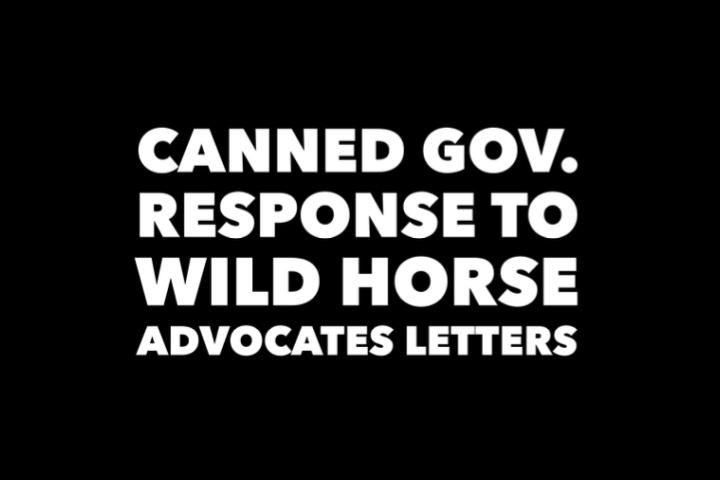
December 13, 2024: The Alberta Provicial Government, under the Minister of Forestry and Parks, and the Rangeland Department, have decided to begin removing wild stallions and darting 90 mares with a 3 year contraceptive, by implementing a new 2023 wild horse management framework that is using "imposed" (non-scientific) (extremely low) poulation thresholds to trigger their culls.
It has been widely proven that the wild horse population was already in decline through natural causes and predation. There is no need for further intervention, .... unless of course, you have a reason to want to speed up the decline. Personal agendas such as the one of our Minister, who is an Outfitter for big game hunters, is certainly to be considered as a driver for quicker population declines. This is without a doubt, a blatant conflict of interest on the part of this Minister, and he should be immediately removed from this portfolio.
With less than 1500 wild horses roaming the Foothills of Alberta, the Government is aiming at 1100, as the first major reduction level. They will not stop until the wild horse population is no longer sustainable, which will lead to eventual extinction. Total eradication was their original plan a decade ago, until the advocates stood in the way. The time in NOW, to do that again.
Dear J….
The Honourable Danielle Smith, Premier of Alberta forwarded me a copy of your email regarding feral horses in Alberta. As Minister of Forestry and Parks, I appreciate the opportunity to respond.
To be clear, there is no cull, and we have not considered a cull.
Furthermore, it is important to note the government is following the Feral Horse Management Framework – which was developed through the Feral Horse Advisory Committee that includes feral horse advocacy groups, academics, wildlife advocacy groups and other experts. Groups including Wild Horses of Alberta Society, the Horse Welfare Alliance of Canada, the Help Alberta Wildies Society, the University of Alberta, the University of Saskatchewan, the Stoney Nakoda First Nation, the Alberta Wildlife Federation, and the Alberta Wilderness Association were all at the table and helped create the framework. More information about the framework and the committee is online at www.alberta.ca/feral-horse-management and www.alberta.ca/feral-horse-advisory-committee.
In fact, as part of the consultation process, the department held more one-on-one meetings with feral horse advocates than with any other stakeholder present. Their voice, and the insight and research they provided was well represented in the final Framework.
The committee considered scientific research from dozens of academic, peer-reviewed sources and several experts, including academics from the Universities of Saskatchewan, Alberta, and Calgary. The office of the Chief Scientist also examined over 150 academic, scientific, and related papers and provided these to the committee to support the development of the framework. A summary of the key scientific findings is available on the feral horse website, noted in the paragraph above.
To keep horse populations in line with the guidelines set out in the Feral Horse Management Framework, using management practices outlined in the framework, the province will pursue adoption – with some horses being selected to go to good homes, and contraception programs – with some horses being selected to receive a one-time vaccine that is effective for an average period of 1-3 years. These programs will only be pursued in the equine management zones where populations are above levels determined by the framework.
When this approach was launched in 2016, it was unanimously supported by horse advocacy groups – and referred to as “the most humane and effective method of controlling the numbers,” in a July 19, 2016, CBC news interview.
In January and February 2025, the ministry will once again conduct the feral horse survey to gather additional data on the population and range of feral horses. The Feral Horse Management Framework recognizes that feral horse populations must be managed as with all domesticated animals and wildlife. Populations like elk, deer and moose are managed to prevent overpopulation and impacts to the landscape. Cattle are not allowed to roam, graze, and populate freely. Their grazing is managed by agrologists and restricts them to clearly defined fenced pastures designed to ensure the land remains healthy and productive.
Alberta’s government is committed to protecting our native wildlife, vegetation, and preserving feral horses. The solutions we’re exploring are aimed at ensuring they can thrive and coexist in their ecosystems – all while maintaining healthy landscapes.
Sincerely,
Honourable Todd Loewen
Minister
Forestry and Parks
780 644-7353
Email: todd.loewen@gov.ab.ca
Smith, Danielle, Honourable Premier,
307 Legislature Building
10800 – 97 Avenue
Edmonton, AB
T5K 2B6
Phone: 780 427-2251
E-mail: premier@gov.ab.ca
Simieritsch, Rob Executive Director
Lands Delivery and Coordination South
Forestry and Parks
Phone: 403 297-8713
Email: Rob.Simieritsch@gov.ab.ca
Alexander, Mike
Director, Rangeland Conservation and Stewardship Section
Range Conservation and Stewardship Section
Forestry and Parks
Phone: 403 382-4299
Mike.Alexander@gov.ab.ca
Cartwright, Kelsey
Rangeland Program Specialist
Range Conservation and Stewardship Section
Forestry and Parks
Phone: 587 574-9930
Kelsey.Cartwright@gov.ab.ca
Contact Us
Office of the Ethics Commissioner
Suite 1250, 9925 – 109 Street NW
Edmonton, Alberta, Canada T5K 2J8
Telephone Number: (780) 422-2273
Fax Number: (780) 422-2261
E-mail Address: info@ethicscommissioner.ab.ca


The page you requested could not be found. Try refining your search, or use the navigation above to locate the post.
April 2025:
We have the opportunity to buy a mare and newborn foal who are sitting on a kill lot who otherwise will be slaughtered at the Bouvry plant in Alberta.
Of course, the initial expense of buying horses from First Nations (or kill buyers) so they are not shipped to slaughter is not the biggest nut to crack. Hay, feed, vetting, farrier, and other costs are needed in addition to funds to initially purchase horses to prevent them from being shipped to slaughter - or being left to languish in pens awaiting the same fate.
We always hate to ask but if you are able to help we would love to be able to purchase these two...
Again, we can’t save them all but with your help we can save these 2.



The page you requested could not be found. Try refining your search, or use the navigation above to locate the post.


The Honourable Lawrence MacAulay, the current Minister of Agriculture and Agri-Food, has the power to end the inhumane export of horses by air for slaughter by enacting a regulatory amendment.
Help spread the word by sharing this email campaign with friends and family! You can also support the cause by donating—your contribution will help fund advertising efforts to raise awareness and push for change. Every action makes a difference!